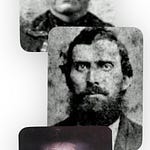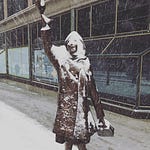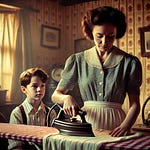They say every family has its historian—the one who asks the questions, notices the transitions, records the events, and tries to assemble a complete picture. The one who will say, This is who we were. In my family, I was that historian. Not because I was the best at it, but because the responsibility somehow found its way to me. Perhaps it was my way of grasping at control and preserving the details everyone else let carelessly slip away.
While others enjoyed the luxury of detachment, I took notes. So when I walked into my grandmother’s hospital room, I knew this would be the last time I saw her alive. Her eighty-year story was drawing to a close, and I was there to bear witness to her final words.
Having just flown in from Minneapolis, I arrived at the hospital in Jasper County, Mississippi, where the waiting room was full of family—my grandmother’s children, grandchildren, and great-grandbabies—each waiting their turn to say goodbye. When my mother heard I had arrived, she rushed from the ICU, her face solemn. After a brief hug, she said, “It’s you she’s been hanging on for.”
My relatives glanced at me curiously, probably wondering why I got to jump the line.
I wasn’t surprised. Of all my uncles and aunts and over fifty cousins, I had always been her pet. She would tell you so. It was a protective love that made even my mother jealous. Perhaps it was because I was the sensitive city boy, a stark contrast to the red-knuckled, calloused world in which she had always lived, dominated by overbearing men, sullen, quick to anger and violence. I was the one who, when bullied by my country cousins or fussed at by my grandfather or attacked by wasps or a jealous mama hen, would run crying from the barnyard, tear up the wobbly plank steps into her kitchen. I’d jump into her lap, bury my face in her neck, and reach for the hump that rose from her back, rubbing it like a talisman.
She would comfort me. Put dipping snuff on my insect stings and try to soften the harsh words of others. If that didn’t work, she’d laugh and make me chocolate pudding.
I loved her fiercely for that. She never looked at me with the judgment others might have. I wasn’t an embarrassment or disappointment to her, as I sometimes feared I was to others. Her love was fierce, tempered by raising a dozen children through the hardships of the Great Depression. Her gaze said she knew me in a way no one else did, and nothing I could do would change that. With her, I could breathe.
I was the first in her line to attend college, just a few miles away. I wrote her letters about university life, and she wrote back in her schoolgirl scrawl—scribbled words on blue-lined paper, uninterrupted by punctuation, telling me about food, sickness, and crops. She always asked about the weather, even though I was less than fifty miles away. I imagine she thought my college town had its own climate, foreign to her. She never complained in those letters, always saying she was fine or getting better, and that if I came to visit, there would be chocolate pudding waiting. It was her way of saying, You may be grown up, but I remember who you are.
Years later, when I visited from “way up north”—a place she’d never been, with weather she couldn’t imagine— I saw how age and illness had stolen so much from her: her sight, her movement, her once-generous frame. While I visited—she clung to me, always wanting me to sit close, patting her hand. It was my turn to comfort her, to shield her from the fears that had once sent me running into her arms.
Now, in this sterile hospital room, she had chosen me one last time. It was me she trusted to carry forward her final words. This do in remembrance of me, said the inscription on the communion table at church. I’d seen it every fourth Sunday but never understood its gravity until this moment. The responsibility felt immense, almost sacred. I wanted to absorb everything, to piece together her meaning and essence before she was gone. And who better than me? After all, didn’t I know her best because she had loved me the most?
I stood by her bedside, gazing down at her wasted body, her gaunt face. One eye taken by cancer years ago; the other strained against the approaching darkness with trembling terror. I took her hand, and for a brief moment, she squeezed mine.
Her breathing rasped like a dry leaf caught in a dying wind, drifting inevitably to earth. So I began my task: I studied her, hoping to remember everything. But then a realization struck me. I didn’t know her. Not really. I never had. To me, she had been a reflection of my childhood, my needs, and my desires.
Bowls of chocolate pudding.
I had loved her as my granny, but how small a part of her life was that? Was I?
This woman had lived through worlds I had never glimpsed—world wars and handsome doughboys, fifteen-year-old brides, smokehouses, wash pots, outhouses, and mules. Her life was woven into family reunions where long-dead aunts recited family trees like ancient spells, and sweltering Sunday mornings thick with gospel music and the smell of bacon grease. She had endured moments that shaped generations, moments she rarely spoke of, and I had never thought to ask. She was the invisible web that held it all together. She was gravity.
My mother, who stood quietly behind me, guarded her own secrets about childhood. She occasionally shared flashes of her past—like when Granny hung laundry, and a boar hog ran between her legs, sending her riding around the yard with the sheet flapping above her head as the children laughed. But my mother also spoke of hiding in a storm pit while Granny absorbed the blows of my drunken grandfather. Those glimpses were few, as if revealing too much would unleash something she couldn’t control.
Now, my mother stood watched as her own mother’s gravity weakened, threatening to throw us all into unfamiliar orbits.
“She’s been fretting to tell you something,” my mother whispered. “Something she won’t tell nobody else.”
On my grandmother’s face, there was a faint smile of recognition, costing her precious strength. Her lips moved, but no sound came. Her expression turned urgent. This is important, she seemed to say, though no words formed. I bent down, putting my ear to her mouth, prepared for a truth that would explain everything—her life, my mother’s life, even mine. The answers that were supposed to come at the end of the story.
I thought I heard something. A rush of breath, broken by the parting of her lips, but no words came.
“What, Granny?” I whispered, desperate.
But there was nothing. Just the faint kiss of life’s last breath against my ear. She had no strength left to shape the sound.
“What did she say?” my mother asked, hope flickering in her voice, as if a final revelation could free her from the weight of the past.
“I don’t know,” I replied. “I can’t understand her.”
My grandmother’s eyes were closed now. I led my mother out of the room and told the others that I knew no more than before I entered. In fact, I had more questions than answers.
I wondered if I would relive this moment with my mother one day, her lying in that bed, me holding her hand, praying for a message. Would I then realize that I had never truly known her either? That I had only known the part of her that was “Mother”? Would the real woman, the one with her own story, have always been beyond my reach?
With each passing, would there be no inheritance but silence—a final exhale, a shudder through the branches as each root is severed? Would silence have the last word?
When they are all gone, when the past loses its corporal pull and exists only as a wordless exhale, a faint breath of memory against my face, will their silences finally tell me what their words never could?
Perhaps that’s why I write. Others seem driven to record the words, conversations, the stories of their cooperatively talkative families. But my people leave mostly a brooding silence in their wake. We are shaped by what isn’t said, by what can’t be said. In those silences live unspoken trauma, resentment, dread, even love. To survive, one must become adept at interpreting the smothering emptiness between words. So, by family necessity, I have become a historian of silences.
Just as the universe abhors a vacuum, silence is a space that demands to be filled. And I write to fill those generational silences with meaning, to give words to the unspoken. Here’s a secret: if you listen to the silence patiently, you’ll find it breathes in the words that will give voice to what lies mute in the heart.
I didn’t understand my grandmother’s last words. But I understand what she meant. And the silent blessing of her life speaks volumes.














